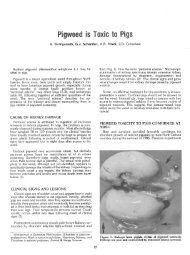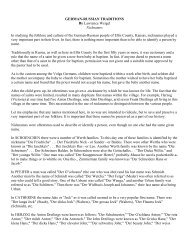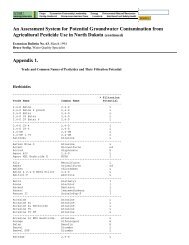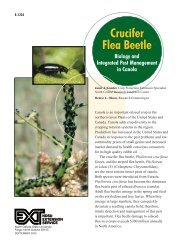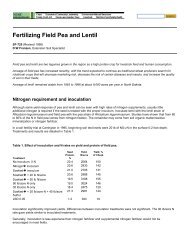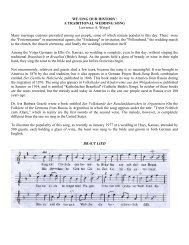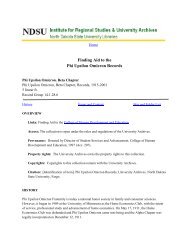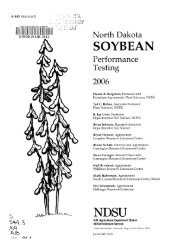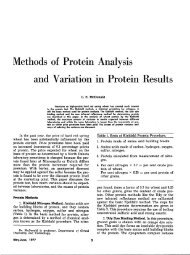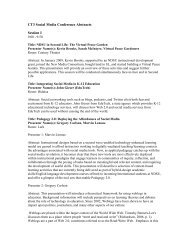germans from russia in fort collins, 1900-2000 - Libraries
germans from russia in fort collins, 1900-2000 - Libraries
germans from russia in fort collins, 1900-2000 - Libraries
You also want an ePaper? Increase the reach of your titles
YUMPU automatically turns print PDFs into web optimized ePapers that Google loves.
WORK RENDERS LIFE SWEET: GERMANS FROM RUSSIA IN FORT COLLINS<br />
The sheer vastness of the steppe forced the<br />
Germans to settle <strong>in</strong> close-knit, isolated communities.<br />
Here they reta<strong>in</strong>ed the language and<br />
customs of the their forefathers while they<br />
adapted to the realities of surviv<strong>in</strong>g on the<br />
brutal landscape. “Separated <strong>from</strong> any semblance<br />
of their homeland, the Volga Germans<br />
stubbornly clung to their traditional ways and<br />
language of their forefathers,” Kloberdanz<br />
writes. “After more than a century of an isolated<br />
existence on the Russian steppe, the<br />
Volga Germans cont<strong>in</strong>ue to assiduously preserve<br />
many eighteenth-century practices.” 13<br />
Not only did the Germans on the Volga rarely<br />
<strong>in</strong>termarry with their Russian neighbors, they<br />
considered themselves culturally superior to<br />
the Russian peasants and Kirghiz and Tartar<br />
tribes. 14<br />
However, the landscape and outside cultures<br />
did manage to <strong>in</strong>fluence German<br />
colonists <strong>in</strong> limited ways. The settlers adapted<br />
the agricultural methods, architecture, and<br />
dress of their Russian neighbors, who, <strong>in</strong> turn,<br />
had adapted those practices to the environment.<br />
For <strong>in</strong>stance, without trees <strong>from</strong> which<br />
to obta<strong>in</strong> the lumber for a typical German<br />
wood-framed house, Volga Germans adapted<br />
puddled-mud and mud-brick construction,<br />
very similar to adobe <strong>in</strong> the American southwest.<br />
Additionally, the colonists <strong>in</strong>corporated<br />
Russian words <strong>in</strong>to their language; slept <strong>in</strong><br />
w<strong>in</strong>ter on their typically Russian earthen<br />
stoves; and drank kvas, which is made <strong>from</strong><br />
fermented black bread. Germans <strong>in</strong> Russia<br />
even <strong>in</strong>stituted obshch<strong>in</strong>a or mir, a Russian<br />
system of communal land division. Thus,<br />
when these Germans <strong>from</strong> Russia appeared <strong>in</strong><br />
northern Colorado for the first time <strong>in</strong> the late<br />
1880’s, their dist<strong>in</strong>ctively Russian cloth<strong>in</strong>g<br />
may have led many to conclude that they<br />
were ethnically Russian as well. They wore<br />
Felzstiefel (felt boots); the men donned Belz<br />
(long sheepsk<strong>in</strong> coats); and the women covered<br />
their heads with Halstuche (black<br />
shawls). 15<br />
The most significant impact on the<br />
Volga-German worldview stemmed <strong>from</strong> the<br />
unprecedented amount of work required to<br />
survive on the steppes. In time, the Germans<br />
<strong>in</strong> Russia began to idealize work <strong>in</strong> their culture.<br />
“Work was such an <strong>in</strong>tegral part of the<br />
Volga German world view that it was sometimes<br />
recognized as a personalized presence,”<br />
Kloberdanz argues. “It was not someth<strong>in</strong>g to<br />
be done; it was someone to be conquered.”<br />
Repeated often was the Volga German maxim<br />
“Arbeit, komm her, ich fress dich auf!”<br />
(Come, work, I will devour you!) or “Arbeit<br />
macht das Leben süss” (Work renders life<br />
sweet). In time, Germans <strong>in</strong> Russia developed<br />
a callous attitude toward physical burdens;<br />
they did not consider women or children<br />
exempt <strong>from</strong> gruel<strong>in</strong>g manual labor, and they<br />
saw their Russian peasant neighbors as lazy<br />
and slow. 16<br />
Despite German successes on the<br />
steppes, Cather<strong>in</strong>e’s promises to the colonists<br />
were far <strong>from</strong> eternal. Even before the end of<br />
the tsar<strong>in</strong>a’s reign, events began slowly erod<strong>in</strong>g<br />
the liberties of all of the empire’s peasants<br />
and foreigners. In 1773, a ragtag army of disgruntled<br />
Cossacks, exiles, peasants, and serfs,<br />
led by Emelian Pugachev, mounted a rebellion<br />
<strong>in</strong> the steppes north of the Caspian Sea.<br />
The vicious attack aga<strong>in</strong>st nobles, Orthodox<br />
priests, government officials, and the imperial<br />
army was the result of mount<strong>in</strong>g taxes and<br />
government supervision, as well as enforced<br />
conscription and the <strong>in</strong>ability for an <strong>in</strong>dividual<br />
to own land. Pugachev was captured <strong>in</strong><br />
1774 and brutally executed, despite<br />
Cather<strong>in</strong>e’s prior reforms aga<strong>in</strong>st capital punishment.<br />
As a result of the upris<strong>in</strong>g, the tsar<strong>in</strong>a<br />
further limited the rights of peasants and<br />
expanded the power of the nobility. The<br />
French Revolution <strong>in</strong> 1789 horrified mon-<br />
SWCA Environmental Consultants Page 3



